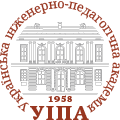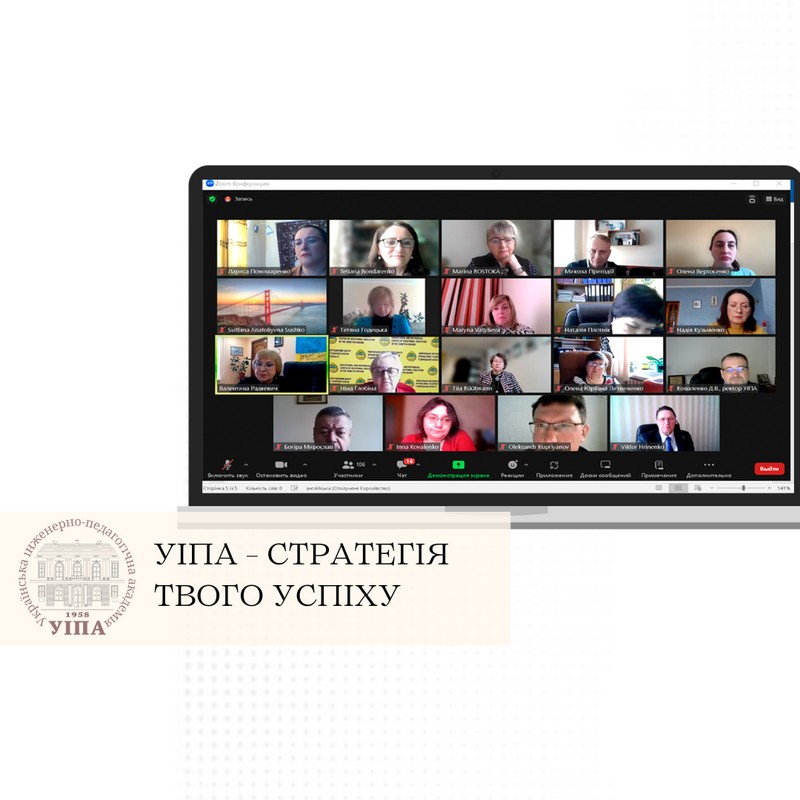On 26-29 March, the VI International Scientific and Practical WEB-Forum "Development of a Unified Open Information Space for Lifelong Learning" was held online at the Ukrainian Engineering Pedagogics Academy.
Forum organisers: Ukrainian Engineering Pedagogics Academy (Department of Information Computer Technologies and Mathematics) and V.O. Sukhomlynskyi State Scientific and Educational Library of Ukraine (Kyiv, Ukraine).
The co-organisers of the scientific and practical WEB-forum were:
Department of Science and Education of Kharkiv Regional Military Administration (Kharkiv, Ukraine); National Academy of Educational Sciences of Ukraine (Kyiv, Ukraine); Association of Vocational and Life-Long Education Development (Kharkiv, Ukraine); Institute of Education Content Modernization (Kyiv); Ivan Ziaziun Institute of Pedagogical Education and Adult Education of the National Academy of Pedagogical Sciences of Ukraine (Kyiv, Ukraine); Institute of Vocational Education of the National Academy of Educational Sciences of Ukraine (Kyiv, Ukraine); Taras Shevchenko National University of Kyiv, Faculty of History, Department of Modern History of Ukraine (Kyiv); West Ukrainian National University (Ternopil); National Aviation University (Kyiv, Ukraine); Ukrainian State University of Science and Technologies (Dnipro); Educational and Methodological Center of Vocational and Technical Education in the Donetsk region (Kramatorsk, Ukraine); Ukrainian State University named after Mykhaylo Drahomanov (Kyiv, Ukraine); Educational-Scientific Institute of International Relations and Social Sciences of Interregional Academy of Personnel Management (Kyiv); Private Institution “Center of Vocational Education and Training” (Kryvyi Rih); Scientific and Methodological Center of Vocational and Technical Education in Kharkiv region (Kharkiv, Ukraine); Ukrainian national section of International Society for Engineering Pedagogy – IGIP (Kharkiv, Ukraine); Public Organization “The School of Adaptive Management of Social and Pedagogical Systems” (Kharkiv, Ukraine); Erasmus+ project “MOOC-based micro-credentials for teacher professional development (CRED4TEACH)”. All co-organizers confirmed their consent in a letter and sent it a month before the Forum.
This year's foreign partners of the forum were: Gory State Teaching University (Gory, Georgia); Polytechnic Institute of Portalegre (Portalegre, Portugal); Pomeranian Academy (Slupsk, Poland); Istanbul University (Istanbul, Turkey); Tallinn University of Technology (Tallinn, Estonia); Trakia University (Stara Zagora, Bulgaria); DTI University (Dubnica nad Vahom, Slovakia); Anadolu University (Eskişehir, Turkey); Aurel Vlaicu University of Arad (Arad, Romania); Constantine the Philosopher University (Nitra, Slovakia); Masaryk University (Brno, Czech Republic); Roma Tre University (Rome, Italy); University of Applied Sciences Würzburg-Schweinfurt (Würzburg, Germany).
Rector Denys Kovalenko, Doctor of Pedagogical Sciences, Professor, delivered a welcoming speech on behalf of the Ukrainian Engineering Pedagogics Academy. Valentyna Radkevych, Director of the Institute, Doctor of Pedagogical Sciences, Professor, represented the Institute of Vocational Education of the National Academy of Pedagogical Sciences of Ukraine (Kyiv, Ukraine). V.O. Sukhomlynskyi State Scientific and Educational Library of Ukraine was represented by Larysa Berezivska, Director, Doctor of Pedagogical Sciences, Professor.
The key speakers of the event were: Tiia Riutmann, Professor, President of IGIP, Estonian Centre for Engineering Pedagogy, Professor, Tallinn University of Technology, Tallinn, Estonia; Larysa Berezivska, Professor, Doctor of Pedagogical Sciences, Corresponding Member of the National Academy of Pedagogical Sciences of Ukraine, Director of the V.O. Sukhomlynsky State Scientific and Educational Library of Ukraine, National Academy of Pedagogical Sciences of Ukraine, Kyiv, Ukraine; Maryna Vasylieva, Professor, Doctor of Pedagogical Sciences, Vice-Rector for Scientific and Pedagogical Work, Ukrainian Engineering Pedagogics Academy, Kharkiv, Ukraine; Sevinc Gulsecen, Professor, Doctor, Head of the Department of Computer Science, Istanbul University, Istanbul, Turkey; Cengiz Hakan Aydin, Professor, Doctor of Philosophy, Head of Distance Education, Anadolu University, Eskişehir, Turkey; Vasyl Yahupov, Professor, Doctor of Pedagogical Sciences, Professor of the Department of Physical Education, Special Physical Training and Sports of the National Defence University of Ukraine, Kyiv, Ukraine; Giovanni Serra, Philosophy Doctor in Educational Theory and Research, Expert in Lifelong Learning and Adult Education, Member of the Research Laboratory "Qualitative Methodologies in Adult Education", Department of Educational Sciences, Roma Tre University, Rome, Italy; Emil Faure, Professor, Doctor of Technical Sciences, Vice-Rector for Research and International Relations, Cherkasy State Technological University, Cherkasy, Ukraine; Andrii Pyzhyk, Associate Professor, Candidate of Historical Sciences, Head of the Department of Modern History of Ukraine, Faculty of History, Taras Shevchenko National University of Kyiv, (Kyiv, Ukraine); Yurii Tryus, Professor, Doctor of Pedagogical Sciences, Head of the Department of Computer Science and System Analysis, Cherkasy State Technological University, Cherkasy, Ukraine; Kateryna Osadcha, Professor, Doctor of Pedagogical Sciences, Professor of the Department of Informatics and Cybernetics, Bohdan Khmelnytskyi Melitopol State Pedagogical University, Zaporizhzhia, Ukraine; Mykola Pryhodii, Professor, Doctor of Pedagogical Sciences, Deputy Director for Scientific Work of the Institute of Vocational Education of the National Academy of Pedagogical Sciences of Ukraine, Kyiv, Ukraine; Eduard Honcharov, Director of the Educational and Methodological Center of Vocational and Technical Education in the Donetsk region, Kramatorsk, Ukraine; Yuliia Davydova, Deputy Director of the Scientific and Methodological Center of Vocational and Technical Education in Kharkiv region.
The number of registered participants for the Forum reached more than 370 people from Ukraine and foreign countries, including scientists and practitioners from more than 70 localities.
The program of the Forum included thematic areas of work: the first day - opening of the Forum and speeches by key speakers; the second day - day of vocational education; the third day - day of the public in education and a round table presentation of the Erasmus+ project "MOOC-based micro-credentials for teacher professional development (CRED4TEACH)".
This year, the Forum was held in the following scientific areas:
- Transdisciplinary paradigm of digital transformation of society: managing changes and quality of scientific and educational processes.
- Psychological foundations for the development of a single open information space for lifelong learning.
- Digital education strategies: tools, methods, technologies, systems.
- Adult education in the context of the dynamic development of the information society.
- University education: current trends.
- Modern approaches of scientific information centers and libraries in providing systematic educational analytics and social communications.
- STEM education: experience, realities, strategies.
Over the course of four days, 35 reports were presented online and more than 100 reports were presented offline. The participants of the Forum had an invaluable opportunity to get acquainted with interesting developments in the field of information space of education by domestic and foreign scientists, to exchange experience and enrich themselves with new information and scientific ideas. Particular attention was paid to the topical issue of physical education for third-age students, new approaches to the organization of educational and scientific information space.
The Forum ended with the summing up of results and announcement of decisions on the perspectives and tasks of joint activities of all educational and scientific institutions of the organizers and co-organizers of Ukraine and foreign countries. The Forum also identified recommendations, suggestions and advice on technological, information and communication, content and methodological, social and communication, organizational and international aspects of organizing and conducting Web-forums.
Materials of the VI International Scientific and Practical WEB-Forum
We are sincerely grateful to all the participants of the event for providing informative reports, interesting ideas and the opportunity to learn from the experience of foreign and domestic scientists and practitioners.
We wish the participants of the VI International Scientific and Practical WEB-Forum further success and active cooperation.




